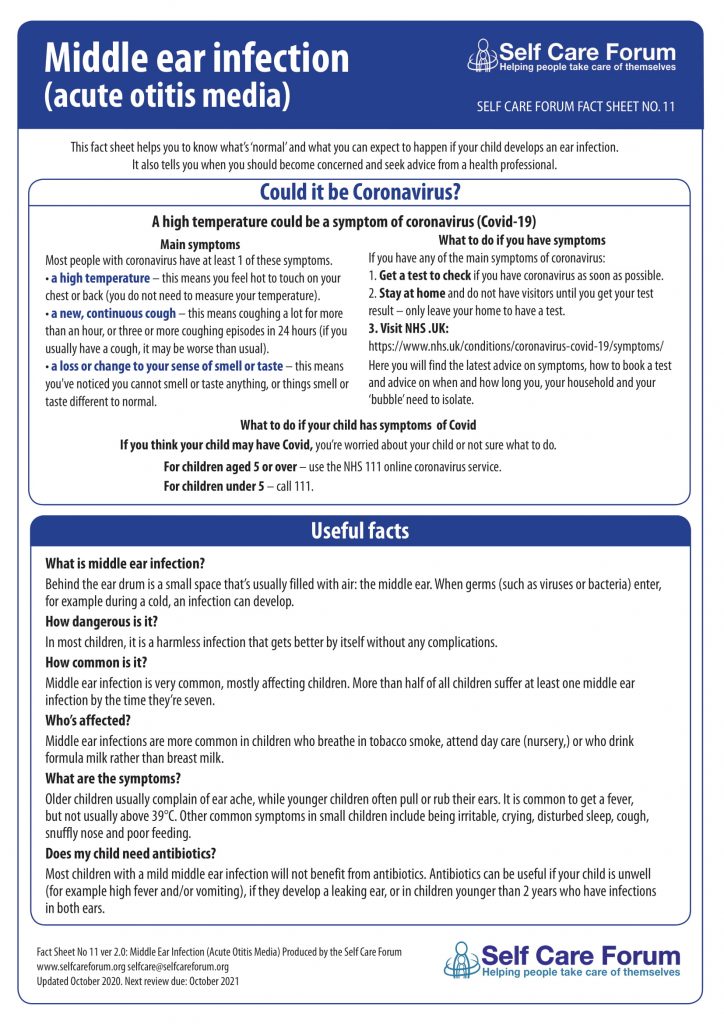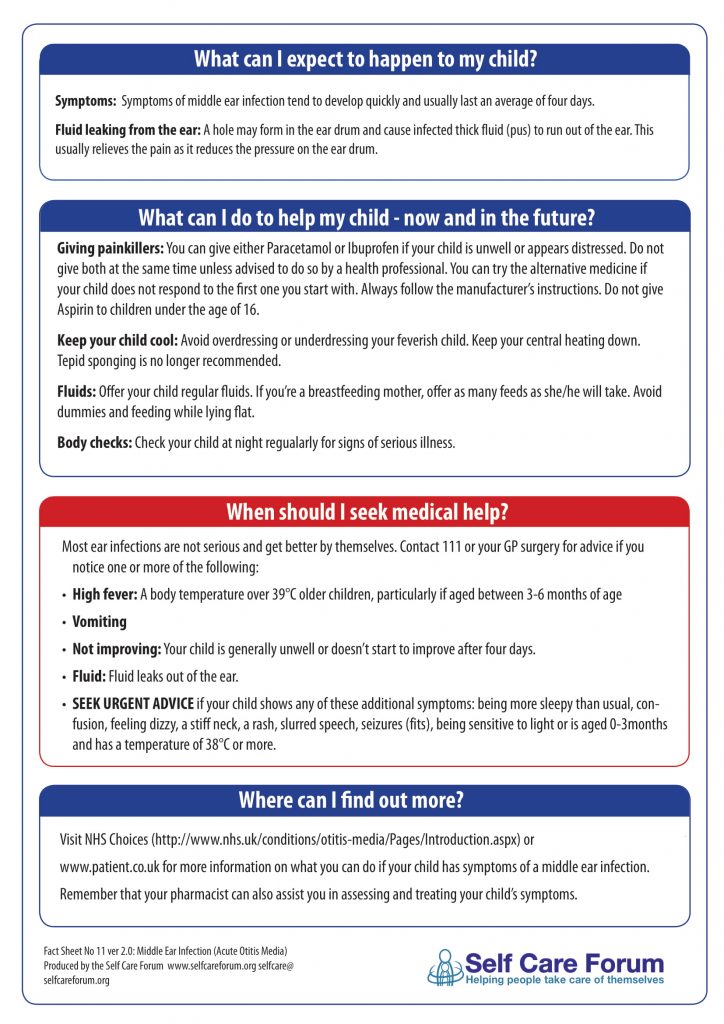Ear infections are very common, particularly in children. You don’t always need to see a GP for an ear infection as they often get better on their own within 3 days.
Check if it’s an ear infection
The symptoms of an ear infection usually start quickly and include:
•pain inside the ear
•a high temperature of 38C or above
•being sick
•a lack of energy
•difficulty hearing
•discharge running out of the ear
•feeling of pressure or fullness inside the ear
•itching and irritation in and around the ear
•scaly skin in and around the ear
Young children and babies with an ear infection may also:
•rub or pull their ear
•not react to some sounds
•be irritable or restless
•be off their food
•keep losing their balance
Most ear infections clear up within 3 days, although sometimes symptoms can last up to a week.Differences between inner ear infection and outer ear infection
How to treat an ear infection yourself
To help relieve any pain and discomfort from an ear infection:
Do
– use painkillers such as paracetamol or ibuprofen (children under 16 shouldn’t take aspirin)
– place a warm or cold flannel on the ear
– remove any discharge by wiping the ear with cotton wool
Don’t
– put anything inside your ear to remove earwax, such as cotton buds or your finger
– let water or shampoo get in your ear
– use decongestants or antihistamines – there’s no evidence they help with ear infections
A pharmacist can help with an ear infection
Speak to a pharmacist if you think you have an outer ear infection.
They can recommend acidic ear drops to help stop bacteria or fungus spreading.
See a GP if you or your child have:
•a very high temperature or feel hot and shivery
•earache that doesn’t start to get better after 3 days
•swelling around the ear
•fluid coming from the ear
•hearing loss or a change in hearing
•other symptoms, like being sick, a severe sore throat or dizziness
•regular ear infections
•a long-term medical condition – such as diabetes, or a heart, lung, kidney or neurological disease
•a weakened immune system – because of chemotherapy, for example
What happens at your appointment
Your GP will often use a small light (an otoscope) to look in the ear.
Some otoscopes blow a small puff of air into the ear. This checks for blockages, which could be a sign of an infection.
Treatment from a GP
Your GP may prescribe medicine for your ear infection, depending on what’s caused it.
Inner ear infections
Antibiotics aren’t usually offered because inner ear infections often clear up on their own, and antibiotics make little difference to symptoms, including pain.
Antibiotics might be prescribed if:
•an ear infection doesn’t start to get better after 3 days
•you or your child has any fluid coming out of their ear
•you or your child has an illness that means there’s a risk of complications, such as cystic fibrosis
They may also be prescribed if your child is less than 2 years old and has an infection in both ears.
Outer ear infections
Your GP might prescribe:
•antibiotic ear drops – to treat a bacterial infection
•steroid ear drops – to bring down swelling
•antifungal ear drops – to treat a fungal infection
•antibiotic tablets – if your bacterial infection is severe
If you have a spot or boil in your ear, your GP may pierce it with a needle to drain the pus.
Ear drops may not work if they’re not used correctly.
Preventing ear infections
You can’t always prevent ear infections, particularly inner ear infections caused by colds and flu.
To help avoid inner ear infections:
•make sure your child is up to date with vaccinations
•keep your child away from smoky environments
•try not to give your child a dummy after they’re 6 months old
To help avoid outer ear infections:
•don’t stick cotton wool buds or your fingers in your ears
•use ear plugs or a swimming hat over your ears when you swim
•try to avoid water or shampoo getting into your ears when you have a shower or bath
•treat conditions that affect your ears, such as eczema or an allergy to hearing aids


Link to the selfcareforum.org website information on Ear Infections (printable) http://www.selfcareforum.org/wp-content/uploads/2013/03/20131030-SCF-Fact-Sheet-No-11-Otitis-Media-v1-final.pdf
